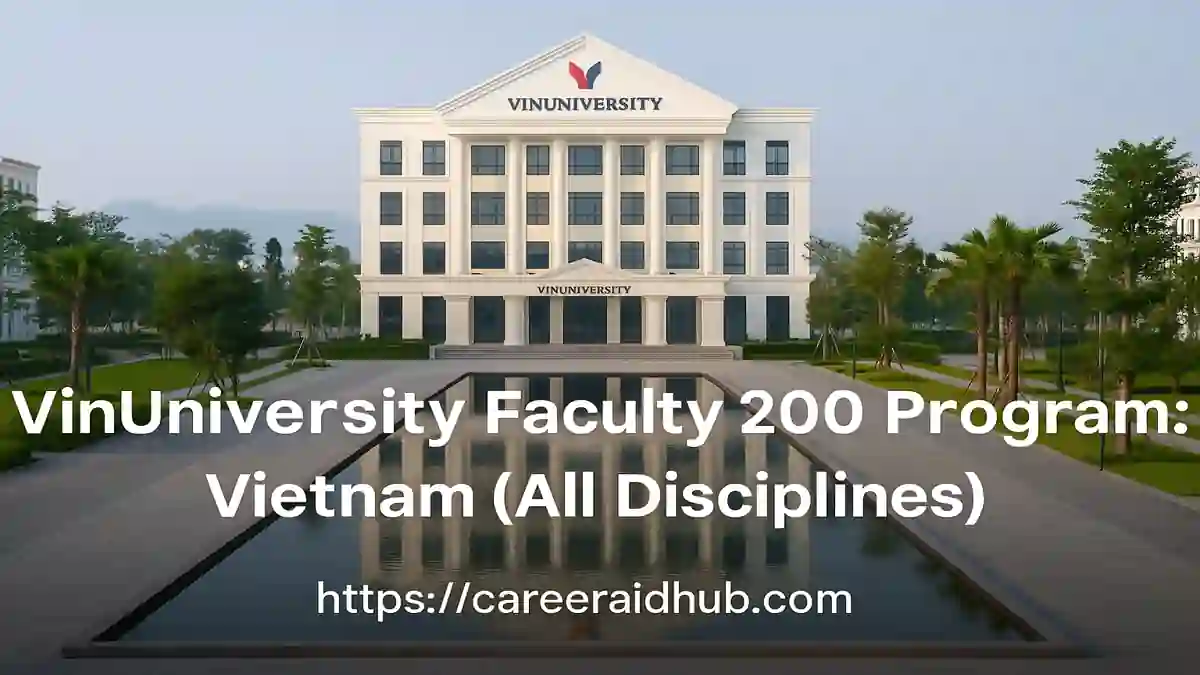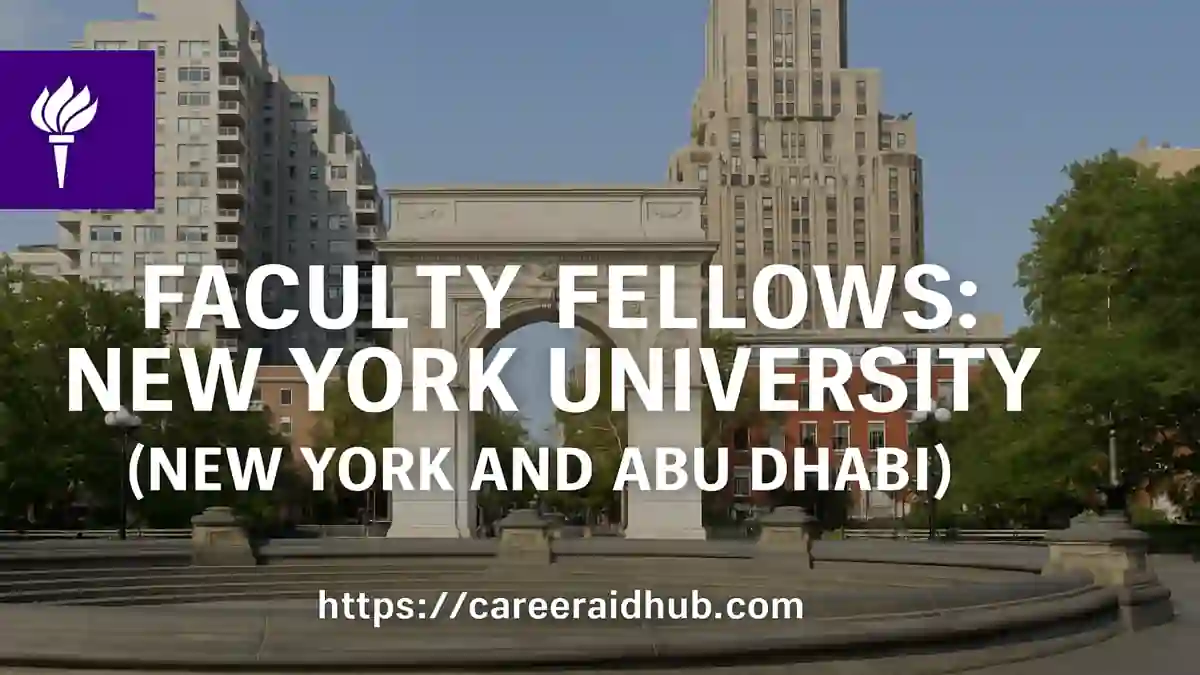Fulbright Visiting Scholar Program: A Comprehensive Country-Specific Application Guide
The Fulbright Visiting Scholar Program represents a prestigious and transformative opportunity for international scholars and researchers seeking to collaborate with academic institutions in the United States. This U.S. Department of State-funded initiative promotes academic excellence, cultural exchange, and global partnerships by facilitating research and lecturing opportunities for non-U.S. citizens.
With approximately 850 awards granted annually across more than 155 participating countries, the program enables selected candidates to engage in full-time scholarly activities at U.S. universities and research centers for a duration ranging from three months to one year. According to the Bureau of Educational and Cultural Affairs (ECA), the program fosters mutual understanding and academic advancement through intellectual and cultural engagement.
This detailed guide outlines the structure, expectations, eligibility, and, most importantly, the country-specific deadlines for the 2026–2027 application cycle.
The Fulbright Visiting Scholar Program stands as a premier academic exchange opportunity, enabling accomplished international scholars and researchers to conduct advanced research or lecture at accredited institutions across the United States. Open to applicants from more than 155 countries, this prestigious program fosters global collaboration, intellectual growth, and cross-cultural understanding. With grants ranging from three to twelve months, participants benefit from
world-class academic environments and robust institutional support. This comprehensive guide outlines everything you need to know for the 2026–2027 cycle—from eligibility criteria to key deadlines—ensuring you are fully prepared to submit a competitive application.
Understanding the Fulbright Visiting Scholar Program
The Fulbright Visiting Scholar Program is designed to facilitate international academic exchange by hosting accomplished professionals, academics, and researchers at U.S. institutions. Participants are given the opportunity to advance their academic careers, contribute to U.S. higher education, and strengthen cross-border academic networks.
Key Features and Objectives
-
-
Open to non-U.S. scholars from more than 155 countries.
-
Encourages academic enrichment, international collaboration, and global citizenship.
-
Provides a platform for scholars to conduct independent research, deliver university lectures, or pursue a combination of both.
-
Areas of Study
Applicants from all academic disciplines are eligible to apply. This includes, but is not limited to:
-
-
Engineering and Physical Sciences
-
Life Sciences and Health
-
Environmental Studies and Sustainability
-
Social Sciences
and Humanities -
Law and Public Policy
-
Business, Economics, and Education
-
The diversity in disciplines reflects the program’s commitment to fostering a well-rounded and inclusive academic community.
Grant Benefits and Financial Support
Each award is tailored to the host country’s budget and the scholar’s proposed activities. Most Fulbright Visiting Scholar grants include:
-
-
A competitive monthly living stipend to cover lodging and daily expenses.
-
Round-trip international airfare for the scholar.
-
Health and accident insurance during the grant period.
-
Book and research materials allowance.
-
Dependent allowance (subject to availability and approval).
-
In some cases, additional housing support or institutional sponsorship may be provided by the U.S. host institution.
-
These benefits ensure that scholars can focus entirely on their academic responsibilities and professional development while residing in the United States.
Roles and Responsibilities of Visiting Scholars
Fulbright scholars are expected to fulfill their academic commitments while also engaging with the local academic and cultural environment. This includes:
-
-
Conducting scholarly research
or teaching at the host university. -
Participating in conferences, seminars, and scholarly events.
-
Engaging with local communities and acting as cultural ambassadors.
-
Strengthening academic relationships between the U.S. and their home institutions.
-
Upon returning to their home country, scholars are encouraged to apply their experience by contributing to institutional development and public service.
Long-Term Impact and Alumni Contributions
Fulbright alumni frequently ascend to leadership roles within academia, government, civil society, and the private sector. They become:
-
-
University leaders and policy advisors.
-
Researchers influencing national and global agendas.
-
Advocates for educational and scientific collaboration.
-
The Fulbright network, comprising over 400,000 alumni globally, continues to foster academic cooperation, diplomacy, and mutual respect among nations.
Country-Specific Deadline Variations
Unlike many international scholarship programs, the Fulbright Visiting Scholar Program is not centralized. Each participating country administers the program either through a binational Fulbright Commission or a U.S. Embassy. As a result, application deadlines, eligibility criteria, and selection processes vary by country.
Why Deadlines Differ
-
-
National administrative structures determine submission periods.
-
Countries may align deadlines with local academic calendars.
-
Some offer
earlier or extended timelines based on regional constraints.
-
Applicants are strongly advised to consult their respective Fulbright Commission or U.S. Embassy to verify deadlines and procedures.
General Application Timeline for 2026–2027 Cycle
| Application Phase | Tentative Timeline |
|---|---|
| Program Announcement | July to September 2024 |
| Application Submission | By October 2025 |
| National Review Process | November to December 2025 |
| U.S. Host Institution Review | December 2025 |
| Final Selection Notification | March to May 2026 |
| Grant Start Date | Academic Year 2026–2027 |
Deadlines typically range between late September and mid-October 2025. Missing these deadlines may disqualify applicants for the current cycle.
Sample Country-Specific Deadlines for 2026–2027
Below is an indicative list of expected deadlines for select countries. Applicants must verify exact dates on their country’s official Fulbright portal.
| Country | Estimated Deadline | Administering Body |
|---|---|---|
| Ukraine | October 15, 2025 | Institute of International Education (IIE) – Kyiv |
| India | Approximately Oct 16 | United States–India Educational Foundation (USIEF) |
| Brazil | Approximately Oct 10 | Fulbright Commission Brazil |
| South Africa | Approximately Oct 15 | U.S. Embassy Pretoria |
| Philippines | Approximately Oct 31 | Philippine-American Educational Foundation |
| Egypt | Approximately Sept 30 | U.S. Embassy Cairo |
| Kenya | Approximately Oct 1 | U.S. Embassy Nairobi |
Locating the Accurate Deadline: Step-by-Step Guide
To identify the specific deadline for your country, follow these steps:
Step 1: Access the Official Portal
Visit https://fulbrightscholars.org or search for your country’s Fulbright website.
Step 2: Navigate to the Application Section
Look for information under tabs such as:
-
-
“How to Apply”
-
“Eligibility”
-
“Important Dates”
-
Step 3: Mark Your Calendar
Note the submission deadline and plan for:
-
-
Time zone differences (if applicable).
-
Buffer time for securing recommendation letters and institutional endorsements.
-
Fulbright Application Components
While specific requirements vary, most countries ask applicants to submit the following:
-
-
A completed online application form.
-
A detailed research or lecturing proposal.
-
An updated academic CV or resume.
-
An invitation letter from a U.S. host (if applicable).
-
Three letters of recommendation.
-
Academic transcripts or degree certificates (as required).
-
Proof of English language proficiency (TOEFL, IELTS, or equivalent documentation).
-
Strong applications clearly demonstrate how the proposed project aligns with the applicant’s academic background and contributes to U.S.–home country collaboration.
Strategic Tips for Applicants
-
-
Begin early: Preparing an application takes time. Start planning 6–9 months before the deadline.
-
Engage recommenders: Allow adequate time for referees to write and submit quality letters.
-
Tailor your proposal: Clearly articulate your research goals, methodology, and expected outcomes.
-
Secure a U.S. host: Institutions with aligned research can provide valuable support.
-
Consult with officials: If uncertain, contact your local Fulbright Commission or U.S. Embassy for guidance.
-
Final Note
Applicants are strongly encouraged to adhere to deadlines and application requirements specific to their country. Preparing a comprehensive application and securing strong institutional support significantly improves the likelihood of success.
For scholars with questions or those needing professional application support, dedicated academic advisors and application consultants can offer personalized guidance.
To remain informed of important updates, eligibility changes, and selection notifications, applicants should monitor official Fulbright Commission websites and embassy announcements regularly.
Quick Summary Table
| Feature | Details |
|---|---|
| Program Name | Fulbright Visiting Scholar Program |
| Host Country / Region | United States |
| Funded By | U.S. Department of State (Bureau of Educational and Cultural Affairs) |
| Duration | 3 to 12 months |
| Study Mode | Full-time, in-person |
| Eligibility | Foreign scholars, researchers, and university faculty |
| Financial Support | Monthly stipend, travel allowance, health insurance, and more |
| Fields of Study | All disciplines |
| Application Deadline | Typically between September and October 2025 |
| Official Website | Click here |
References
-
Fulbright Visiting Scholar Program Overview. Bureau of Educational and Cultural Affairs, U.S. Department of State.
FAQs for the Fulbright Visiting Scholar Program
The Fulbright Visiting Scholar Program offers international scholars the chance to conduct research or lecture at U.S. institutions for three to twelve months.
Applicants must be non-U.S. citizens with a doctoral degree or equivalent professional experience in their field of expertise.
You must apply through your country’s Fulbright Commission or U.S. Embassy using their official online portal and specific guidelines.
Deadlines vary by country but generally fall between September and October for the following academic year.
The grant includes a monthly stipend, round-trip airfare, health insurance, and support for research or academic expenses.
Yes, you can propose a host institution, but final placement may depend on institutional support and program approval.
Yes, applicants must demonstrate strong English skills through standardized tests or documentation from academic institutions.
In most cases, dependents may accompany you, and some grants offer partial support for spouses or children.
The program supports all disciplines, including STEM, humanities, social sciences, health, law, and education.
Most grants begin with the U.S. academic year, starting in August or September, depending on the host institution’s calendar.
Premium Mentorship for a Stronger Application
- Premium Mentorship: personalised 1:1 guidance for this and similar opportunities
- In-depth review of your CV, academic profile, and key statements
- Aligned with international selection criteria so your profile matches what panels expect
- Stronger, more compelling narrative for highly competitive calls
- Step-by-step support from opportunity mapping to final submission (fee-based)










